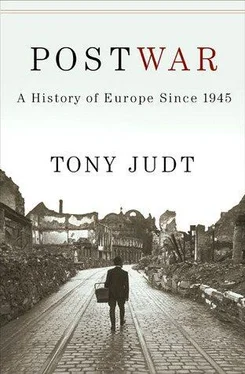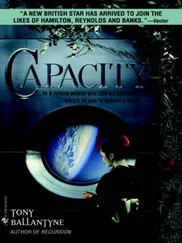In Belgium, Catholic parties in the first post-war parliament protested at the idea of any compensation being paid to ‘Jews arrested simply for a racial motive’—most of whom, it was hinted, were probably black-marketeers. Indeed, in Belgium the exclusion of Jews from any post-war benefits was taken a step further. Since 95 percent of the Jews deported from Belgium had been foreign nationals or stateless, it was determined by a post-war law that—unless they had also fought in the organized resistance movements—surviving Jews who ended up in Belgium after the war would not be eligible for any public aid. In October 1944, the Belgian authorities automatically ascribed the nationality ‘German’ to any Jewish survivor in Belgium who could not prove his or her Belgian citizenship. Theoretically this abolished all wartime ‘racial’ distinctions—but it also turned surviving Jews into de facto enemy aliens who could be interned and whose property was seized (and not returned until January 1947). Such rulings had the attendant benefit of marking these Jews for eventual return to Germany, now that they were no longer threatened by Nazi persecution.
In the Netherlands, where, according to the Dutch resistance paper Vrij Nederland , the Nazis themselves had been taken aback at the alacrity with which local citizens and civic leaders cooperated in their own humiliation, the handful of returning Jews was decidedly unwelcome. One of them, Rita Koopman, recalled being greeted thus upon her return: ‘Quite a lot of you came back. Just be happy you weren’t here—how we suffered from hunger!’ Indeed, the Dutch did suffer greatly through the ‘Hunger Winter’ of 1944-45 and the many houses vacated by deported Jews, in Amsterdam especially, were a valuable source of wood and other supplies. But for all the enthusiastic cooperation of Dutch wartime officialdom in identifying and rounding up the country’s Jews, the post-war authorities—their own conscience clear—felt no obligation to make any particular amends to Jews. Instead, they made a rather self-congratulatory point of refusing to distinguish among Dutch citizens on racial or any other grounds and thus froze the country’s lost Jews into retrospective anonymity and invisibility. In the Fifties, the Catholic prime ministers of the Netherlands even declined to contribute to a proposed international monument at Auschwitz, dismissing it as ‘Communist propaganda’.
In eastern Europe there was of course never much question of recognizing Jewish suffering, much less compensating it. In the immediate post-war years Jews in this region were concerned above all with merely staying alive. Witold Kula, a non-Jewish Pole, wrote in August 1946 of a train journey from Łódz to Wrocław where he witnessed the anti-Semitic mocking of a Jewish family: ‘The average Polish intellectual doesn’t realize that a Jew in Poland today cannot drive a car, doesn’t risk a train journey, dare not send his child on a school outing; he cannot go to remote localities, prefers big cities even to medium-sized ones and is ill-advised to take a walk after nightfall. You would have to be a hero to go on living in such an atmosphere after six years of torment’.
After Germany’s defeat, many Jews in eastern Europe pursued their wartime survival strategy: hiding their Jewish identity from their colleagues, their neighbours and even their children, blending as best they could into the post-war world and resuming at least the appearance of normal life. And not only in eastern Europe. In France, although new laws forbade the overt anti-Semitic rhetoric of pre-war public life, the legacy of Vichy remained. The taboos of a later generation had not yet taken hold, and behaviour that would in time be frowned upon was still acceptable. As in the Thirties, the Left was not immune. In 1948 the Communist parliamentarian Arthur Ramette drew attention to certain prominent Jewish politicians—Léon Blum, Jules Moch, René Mayer—in order to contrast them with the parliamentarians of his own party: ‘We Communists have only French names’ (a claim as unseemly as it was untrue).
In these circumstances, the choice for most of Europe’s Jews seemed stark: depart (for Israel once it came into existence, or America after its doors were opened in 1950) or else be silent and, so far as possible, invisible. To be sure, many of them felt an overwhelming urge to speak and bear witness. In Primo Levi’s words, he was driven by an ‘absolute, pathological narrative charge’ to write down what he had just experienced. But then Levi’s own fate is instructive. When he took Se questo è un uomo , the story of his incarceration in Auschwitz, to the leading left-wing Italian publisher Einaudi in 1946, it was rejected out of hand: Levi’s narrative of persecution and survival, beginning with his deportation as a Jew rather than as a resister, did not conform to uplifting Italian accounts of nationwide anti-Fascist resistance.
Se questo è un uomo was published instead by a small press in just 2,500 copies—most of which were remaindered in a warehouse in Florence and destroyed in the great flood there twenty years later. Levi’s memoir was not published in Britain until 1959, when If This Is a Man sold only a few hundred copies (nor did the US edition, under the title Survival in Auschwitz , begin to sell well until twenty years later). Gallimard, the most prestigious of the French publishing houses, for a long time resisted buying anything by Levi; only after his death in 1987 did his work, and his significance, begin to gain recognition in France. Like his subject, then, Primo Levi remained largely inaudible for many years: no-one was listening. In 1955 he noted that it had become ‘indelicate’ to speak of the camps: ‘One risks being accused of setting up as a victim, or of indecent exposure’. Giuliana Tedeschi, another Italian survivor of Auschwitz, made the same point: ‘I encountered people who didn’t want to know anything, because the Italians, too, had suffered, after all, even those who didn’t go to the camps…. They used to say, “For heaven’s sake, it’s all over,” and so I remained quiet for a long time’. [416]
Even in Great Britain the Holocaust was not discussed in public. Just as the representative concentration camp for the French was Buchenwald, with its well-organised committees of Communist political prisoners, so in post-war Britain the iconic image of a Nazi camp was not Auschwitz but Bergen-Belsen (liberated by British troops); and the skeletal survivors recorded on film and shown in cinema newsreels at the end of the war were not typically identified as Jews. [417]In post-war Britain, too, Jews often preferred to maintain a low profile and keep their memories to themselves. Writing in 1996 of his English childhood as the son of camp survivors, Jeremy Adler recalled that whereas there were no taboos at home about discussing the Holocaust, the topic remained off limits everywhere else: ‘My friends could boast of how dad had fought with Monty in the desert. My own father’s experiences were unmentionable. They had no place until recently. The public cycle from repression to obsession in Britain took about fifty years’. [418]
In retrospect it is the universal character of the neglect that is most striking. The Holocaust of the Jews was put out of mind not only in places where there were indeed good reasons not to think about it—like Austria, say (which had just one-tenth the population of pre-war Germany but supplied one in two of all concentration camp guards), or Poland; but also in Italy—where most of the nation had no cause for shame on this score—or in Britain, where the war years were otherwise looked upon with pride and even some nostalgia. The rapid onset of the Cold War contributed, of course. [419]But there were other reasons too. For most Europeans, World War Two had not been about the Jews (except in so far as they were blamed for it), and any suggestion that Jewish suffering might claim pride of place was deeply resented.
Читать дальше












